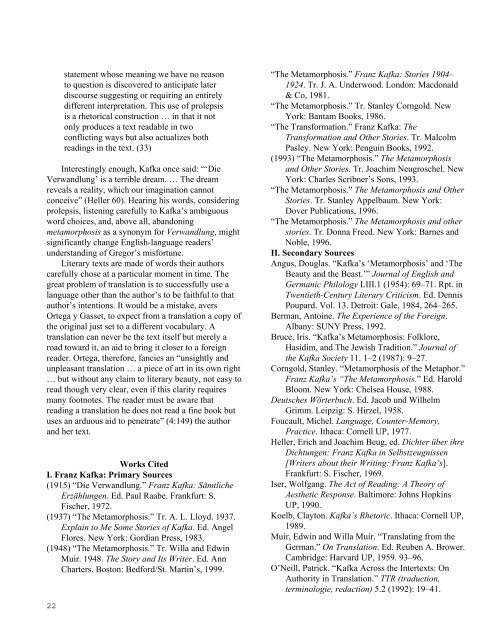their - The University of Texas at Dallas
their - The University of Texas at Dallas
their - The University of Texas at Dallas
You also want an ePaper? Increase the reach of your titles
YUMPU automatically turns print PDFs into web optimized ePapers that Google loves.
st<strong>at</strong>ement whose meaning we have no reason<br />
to question is discovered to anticip<strong>at</strong>e l<strong>at</strong>er<br />
discourse suggesting or requiring an entirely<br />
different interpret<strong>at</strong>ion. This use <strong>of</strong> prolepsis<br />
is a rhetorical construction … in th<strong>at</strong> it not<br />
only produces a text readable in two<br />
conflicting ways but also actualizes both<br />
readings in the text. (33)<br />
Interestingly enough, Kafka once said: “‘Die<br />
Verwandlung’ is a terrible dream. … <strong>The</strong> dream<br />
reveals a reality, which our imagin<strong>at</strong>ion cannot<br />
conceive” (Heller 60). Hearing his words, considering<br />
prolepsis, listening carefully to Kafka’s ambiguous<br />
word choices, and, above all, abandoning<br />
metamorphosis as a synonym for Verwandlung, might<br />
significantly change English-language readers’<br />
understanding <strong>of</strong> Gregor’s misfortune.<br />
Literary texts are made <strong>of</strong> words <strong>their</strong> authors<br />
carefully chose <strong>at</strong> a particular moment in time. <strong>The</strong><br />
gre<strong>at</strong> problem <strong>of</strong> transl<strong>at</strong>ion is to successfully use a<br />
language other than the author’s to be faithful to th<strong>at</strong><br />
author’s intentions. It would be a mistake, avers<br />
Ortega y Gasset, to expect from a transl<strong>at</strong>ion a copy <strong>of</strong><br />
the original just set to a different vocabulary. A<br />
transl<strong>at</strong>ion can never be the text itself but merely a<br />
road toward it, an aid to bring it closer to a foreign<br />
reader. Ortega, therefore, fancies an “unsightly and<br />
unpleasant transl<strong>at</strong>ion … a piece <strong>of</strong> art in its own right<br />
… but without any claim to literary beauty, not easy to<br />
read though very clear, even if this clarity requires<br />
many footnotes. <strong>The</strong> reader must be aware th<strong>at</strong><br />
reading a transl<strong>at</strong>ion he does not read a fine book but<br />
uses an arduous aid to penetr<strong>at</strong>e” (4:149) the author<br />
and her text.<br />
Works Cited<br />
I. Franz Kafka: Primary Sources<br />
(1915) “Die Verwandlung.” Franz Kafka: Sämtliche<br />
Erzählungen. Ed. Paul Raabe. Frankfurt: S.<br />
Fischer, 1972.<br />
(1937) “<strong>The</strong> Metamorphosis.” Tr. A. L. Lloyd. 1937.<br />
Explain to Me Some Stories <strong>of</strong> Kafka. Ed. Angel<br />
Flores. New York: Gordian Press, 1983.<br />
(1948) “<strong>The</strong> Metamorphosis.” Tr. Willa and Edwin<br />
Muir. 1948. <strong>The</strong> Story and Its Writer. Ed. Ann<br />
Charters. Boston: Bedford/St. Martin’s, 1999.<br />
“<strong>The</strong> Metamorphosis.” Franz Kafka: Stories 1904–<br />
1924. Tr. J. A. Underwood. London: Macdonald<br />
& Co, 1981.<br />
“<strong>The</strong> Metamorphosis.” Tr. Stanley Corngold. New<br />
York: Bantam Books, 1986.<br />
“<strong>The</strong> Transform<strong>at</strong>ion.” Franz Kafka: <strong>The</strong><br />
Transform<strong>at</strong>ion and Other Stories. Tr. Malcolm<br />
Pasley. New York: Penguin Books, 1992.<br />
(1993) “<strong>The</strong> Metamorphosis.” <strong>The</strong> Metamorphosis<br />
and Other Stories. Tr. Joachim Neugroschel. New<br />
York: Charles Scribner’s Sons, 1993.<br />
“<strong>The</strong> Metamorphosis.” <strong>The</strong> Metamorphosis and Other<br />
Stories. Tr. Stanley Appelbaum. New York:<br />
Dover Public<strong>at</strong>ions, 1996.<br />
“<strong>The</strong> Metamorphosis.” <strong>The</strong> Metamorphosis and other<br />
stories. Tr. Donna Freed. New York: Barnes and<br />
Noble, 1996.<br />
II. Secondary Sources<br />
Angus, Douglas. “Kafka’s ‘Metamorphosis’ and ‘<strong>The</strong><br />
Beauty and the Beast.’” Journal <strong>of</strong> English and<br />
Germanic Philology LIII.1 (1954): 69–71. Rpt. in<br />
Twentieth-Century Literary Criticism. Ed. Dennis<br />
Poupard. Vol. 13. Detroit: Gale, 1984, 264–265.<br />
Berman, Antoine. <strong>The</strong> Experience <strong>of</strong> the Foreign.<br />
Albany: SUNY Press, 1992.<br />
Bruce, Iris. “Kafka’s Metamorphosis: Folklore,<br />
Hasidim, and <strong>The</strong> Jewish Tradition.” Journal <strong>of</strong><br />
the Kafka Society 11. 1–2 (1987): 9–27.<br />
Corngold, Stanley. “Metamorphosis <strong>of</strong> the Metaphor.”<br />
Franz Kafka’s “<strong>The</strong> Metamorphosis.” Ed. Harold<br />
Bloom. New York: Chelsea House, 1988.<br />
Deutsches Wörterbuch. Ed. Jacob und Wilhelm<br />
Grimm. Leipzig: S. Hirzel, 1958.<br />
Foucault, Michel. Language, Counter-Memory,<br />
Practice. Ithaca: Cornell UP, 1977.<br />
Heller, Erich and Joachim Beug, ed. Dichter über ihre<br />
Dichtungen: Franz Kafka in Selbstzeugnissen<br />
[Writers about <strong>their</strong> Writing: Franz Kafka’s].<br />
Frankfurt: S. Fischer, 1969.<br />
Iser, Wolfgang. <strong>The</strong> Act <strong>of</strong> Reading: A <strong>The</strong>ory <strong>of</strong><br />
Aesthetic Response. Baltimore: Johns Hopkins<br />
UP, 1990.<br />
Koelb, Clayton. Kafka’s Rhetoric. Ithaca: Cornell UP,<br />
1989.<br />
Muir, Edwin and Willa Muir. “Transl<strong>at</strong>ing from the<br />
German.” On Transl<strong>at</strong>ion. Ed. Reuben A. Brower.<br />
Cambridge: Harvard UP, 1959. 93–96.<br />
O’Neill, P<strong>at</strong>rick. “Kafka Across the Intertexts: On<br />
Authority in Transl<strong>at</strong>ion.” TTR (traduction,<br />
terminologie, redaction) 5.2 (1992): 19–41.<br />
22

















